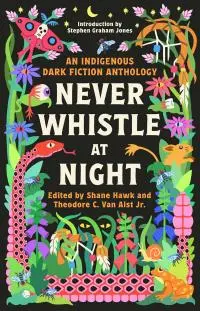There’s a belief across numerous cultures that whistling at nighttime can attract evil spirits and misfortune. Hence the title of this anthology, which warns against such activity, because as Stephen Graham Jones notes in his foreword, “you don’t invite bad stuff, right?” You have control over your own fate, Jones indicates. You can choose to keep the “bad stuff” at bay.
And yet, while no character in this collection of stories makes the mistake of pursing lips together after the sun has gone down, strange things continuously befall them, often despite their best efforts to stay out of harm’s way. This is often no fault of the protagonist in question, but rather due to forces (read: other people) outside their control.
Each story runs into the next with the ease of a river, alternating between tumultuous and serene waters.
Consider for example “Kushtuka” by Mathilda Zeller, the first story in the anthology. In it, a young woman named Tapeesa has simple desires — go to school, and maybe someday marry her more-than-good friend Pana. Unfortunately, Hank, a white man, has been “acquiring” native artifacts for his lodge, including spears belonging to Tapeesa’s grandfather, and his flippancy toward the theft unleashes the titular creature. Problem is, the shapeshifting kushtuka takes the form of Tapeesa, becoming a monster both outside herself and a kind of manifestation of her rage toward Hank and all that he stands for. How can Tapeesa control something that is both her and not her at the same time?
Not every story is as directly supernatural as “Kushtuka,” though each do contain some hint of the fantastic, existing just outside “the borders of the real,” as Jones puts it. Rebecca Roanhorse’s “White Hills,” Conley Lyons’s “Navajos Don’t Wear Elk Teeth,” and Marcie R. Rendon’s “Wingless” — the next three tales — exemplify this idea of (other)worldliness, dealing respectively with a part-Native woman’s attempts to erase her own heritage, a man’s dangerous relationship (for lack of a better term) with a jealous and covetous white lover, and two youths grappling with horrendously abusive foster parents. The monsters in these stories are human, but they all seem to be possessed by something unearthly, and they all commit inhuman deeds.
“Quantum” by Nick Medina is more surreal than the trio mentioned above, though it still maintains the humans-as-monsters theme. The threats are less baldly external here. As the title suggests, the story explores the contentious subject of blood quantum laws, which some tribes use to determine its membership. It’s a complex issue that can’t be effectively unpacked here, but this knotty quality to the matter is exactly what makes it such a potent backdrop for a horror story, one that Medina handles with the perfect level of care and expertise.
 Though their credits as anthologists are few, editors Shane Hawk and Theodore C. Van Alst, Jr. prove themselves masters of flow throughout Never Whistle at Night. Each story runs into the next with the ease of a river, alternating between tumultuous and serene waters. This is true of the stories already mentioned, and all that follow. The collection overall feels more like a novel told in diverse yet interconnected segments, each interdependent upon one another, all standouts in their own right.
Though their credits as anthologists are few, editors Shane Hawk and Theodore C. Van Alst, Jr. prove themselves masters of flow throughout Never Whistle at Night. Each story runs into the next with the ease of a river, alternating between tumultuous and serene waters. This is true of the stories already mentioned, and all that follow. The collection overall feels more like a novel told in diverse yet interconnected segments, each interdependent upon one another, all standouts in their own right.
There isn’t enough space to write about all of them here, but other highlights include: “Before I Go” by Norris Black, a quick, heartbreaking exploration of grief that turns dangerous; “Scariest. Story. Ever” by Richard Van Camp, which features multiple scary stories within its framing narrative, and a rather sweet ending; “The Prepper” by Morgan Talty, a harrowing journey through one young man’s mental delusions; “Sundays” by David Heska Wanbli Weiden, which grapples with the myriad horrors of boarding schools; “Eulogy for a Brother, Resurrected” by Carson Faust, another story about dangerous grief, this one highlighting the lengths one might go to bring someone special back; “Collections” by Amber Blaeser-Wardzala, a surreal nightmare about the desire for recognition; and last but not least “Limbs” by Waubgeshig Rice, a shocking period piece that closes the anthology and leaves the reader wanting more.
Perhaps most exciting about Never Whistle at Night is that, while it is broadly a collection of marginalized voices, it also makes room for plenty of women and one two-spirit writer (the aforementioned Carson Faust). Hawk and Van Alst, Jr. not only deliver a first-rate anthology, story-wise, they also deliver on diversity. This is truly a special book, one already praised by Nick Cutter, Tananarive Due, Brian Evenson, and Laird Barron, among others. Pick up a copy and prepare to be disturbed, riveted, heartbroken, and enlightened.
Get Never Whistle at Night at Bookshop or Amazon

About the author
Christopher Shultz writes plays and fiction. His works have appeared at The Inkwell Theatre's Playwrights' Night, and in Pseudopod, Unnerving Magazine, Apex Magazine, freeze frame flash fiction and Grievous Angel, among other places. He has also contributed columns on books and film at LitReactor, The Cinematropolis, and Tor.com. Christopher currently lives in Oklahoma City. More info at christophershultz.com








